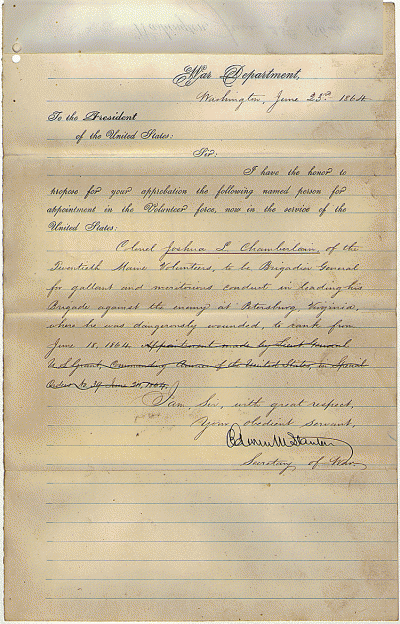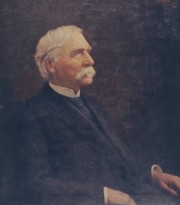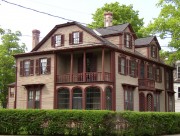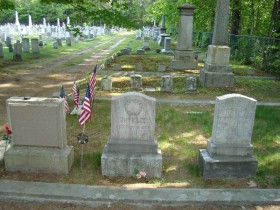(1828-1914) was born September 8, 1828, in Brewer the eldest of five children. He worked on his father’s farm and, like many other promising young men, taught school for a time.
Entering Bowdoin College in Brunswick in 1848, Chamberlain studied the traditional classical curriculum and showed particular skill at languages. At First Parish Church, he met, then married, Fannie Adams.
Chamberlain graduated in the Class of 1852, and returned north for three more years of study at Bangor Theological Seminary. He accepted a position at Bowdoin teaching rhetoric (which combined elements of what we would now call speech, with English literature and persuasive writing) and, later, modern languages.
Chamberlain knew little of soldiering, but he was keenly aware that his father had commanded troops in the bloodless Aroostook War of 1839 with Canada. In addition, his grandfather had been locally prominent in the War of 1812, and his great-grandfathers had participated in the Revolution.
In 1861, early in the Civil War, Chamberlain felt a strong urge to fight to save the union. (Although sympathetic to the plight of the slaves, he is not known to have been an abolitionist and showed little interest, after the war, in the cause of the freedmen.) He volunteered his services and was soon made lieutenant colonel of the 20th Maine Volunteer Infantry Regiment. He was wounded six times — once, almost fatally — and had six horses shot from under him.

Letter to President Lincoln from Secretary of War Stanton recommending Chamberlain for promotion to Brigadier General (National Archives)
He is best remembered for two great events. The first was the action at Little Round Top in Gettysburg, July 2, 1863, when then Colonel Chamberlain and the 20th Maine held the extreme left flank of the Union line against a fierce rebel attack. The second was the surrender of Lee’s Army of Northern Virginia at Appomattox, when Grant chose Chamberlain to receive the formal surrender of weapons and colors on April 12, 1865.
Chamberlain had his men salute the defeated Confederates as they marched by, evidence of his admiration of their valor and of Grant’s wish to encourage the rebel armies still in the field to accept the peace.
He returned briefly to academic duties at Bowdoin, but was soon elected as a popular war hero to four terms as governor (1867-1871) — helping establish a century of domination of Maine politics by the Republican Party.
Early in his term he faced death again in the form of Maine’s death penalty. Aware of the inequities of its application, he appealed to the legislature: “I wish to suggest whether it would not be well, if we cannot make practice conform to our laws to make our laws agree with our practice. . . . Either abolish capital punishment altogether or fix upon a day after the year of grace on which the sentence shall be executed.” (With no required execution date, governors had habitually not signed death warrants, leaving the condemned on death row for many years.)
Ironically, in 1869 Chamberlain signed the death warrant of a young black man and at the same time commuted the death sentence of two whites, refusing comment to the press. In seven years capital punishment was abolished in Maine.
Former Governor Chamberlain returned to Bowdoin to spend far more of his life as an educator than as a soldier. In 1871, he was persuaded to accept the presidency of the college. Throughout the 1870s and 1880s, he continued to write, teach, lecture, and participate actively in the G.A.R. (Grand Army of the Republic) and other veterans’ groups. He also served as the first President of the Board of the Evans Rifle Manufacturing Company of Mechanic Falls. His reputation for coolness and courage was confirmed in 1880 when, as commander of the militia, he was called to keep order in Augusta amid an angrily disputed state election.
Ill health led to his resignation as Bowdoin’s president in 1883. In 1893 Congress finally gave him the Congressional Medal of Honor for his leadership and heroism at Gettysburg.
Chamberlain spent much of the final three decades of his life in private ventures and in writing accounts of his battles. In 1900 he was appointed Surveyor of the Port of Portland, where he lived until his death in 1914 at age 85.
Chamberlain faded from national view for most of the 20th century. No statue of him was ever erected at Gettysburg; few historians studied his campaigns. But amid the surge of interest in the Civil War in the 1990’s he emerged as an exemplary figure among the Union generals, the very model of the citizen-soldier.
[From Charles Calhoun’s biography for the Pejepscot Historical Society with permission of the Society]
Additional resources
The Pejepscot Historical Society, Brunswick, Maine, maintains substantial collections of Chamberlain’s correspondence and other records, and it operates his Brunswick home as a historic house.
Chase, Henry. ed. Representative Men of Maine
Joshua Chamberlain and the 20th Maine. (moving image)
Kennedy, Robert Francis, Jr. Joshua Chamberlain and the American Civil War. Illustrations by Nikita Andreev. New York: Hyperion Books for Children. c2007.
Longacre, Edward G. Joshua Chamberlain: The Soldier and the Man. Conshohocken, Pa. Combined Pub. c1999.
*MacDonald, William. “Joshua Lawrence Chamberlain,” Dictionary of American Biography. New York: Charles Scribner’s Sons, 1933, Vol. 3, pp. 597-598.
Maine State Archives. Records Relating to the Civil War Career of Joshua Lawrence Chamberlain. Augusta, Me. The Archives. 1977.
*McIntyre, Philip W. and Blanding, William F. Men of Progress. Boston: New England Magazine, 1897, pp. 565-568.
*Pullen, John J. Joshua Chamberlain, A Hero’s Life & Legacy. Mechanicsburg, Pa: Stackpole Books, 1999.
Pullen, John J. The Twentieth Maine. Philadelphia, Lippincott, 1957.
Pullen, John J. The Twentieth Maine: A Volunteer Regiment in the Civil War. Dayton, Ohio: Press of Morningside Bookshop. 1984.
Trulock, Alice R. In the Hands of Providence: Joshua L. Chamberlain and the American Civil War. Chapel Hill, NC : University of North Carolina Press, 1992.
Schriver, Edward, “Reluctant Hangman: The State of Maine and Capital Punishment, 1820-1887.” The New England Quarterly. Vol. 63, No. 2, June, 1990.
*Simpson, Brooks D. “Joshua Lawrence Chamberlain,” American National Biography. New York: Oxford University Press, 1999, Vol. 4, pp. 635-636.
*Wallace, Willard M. Soul Of The Lion. New York: Thomas Nelson & Sons, 1960
————————
*Cited in Friends of the Blaine House at http://blainehouse.org/governors (accessed April 26, 2011)




